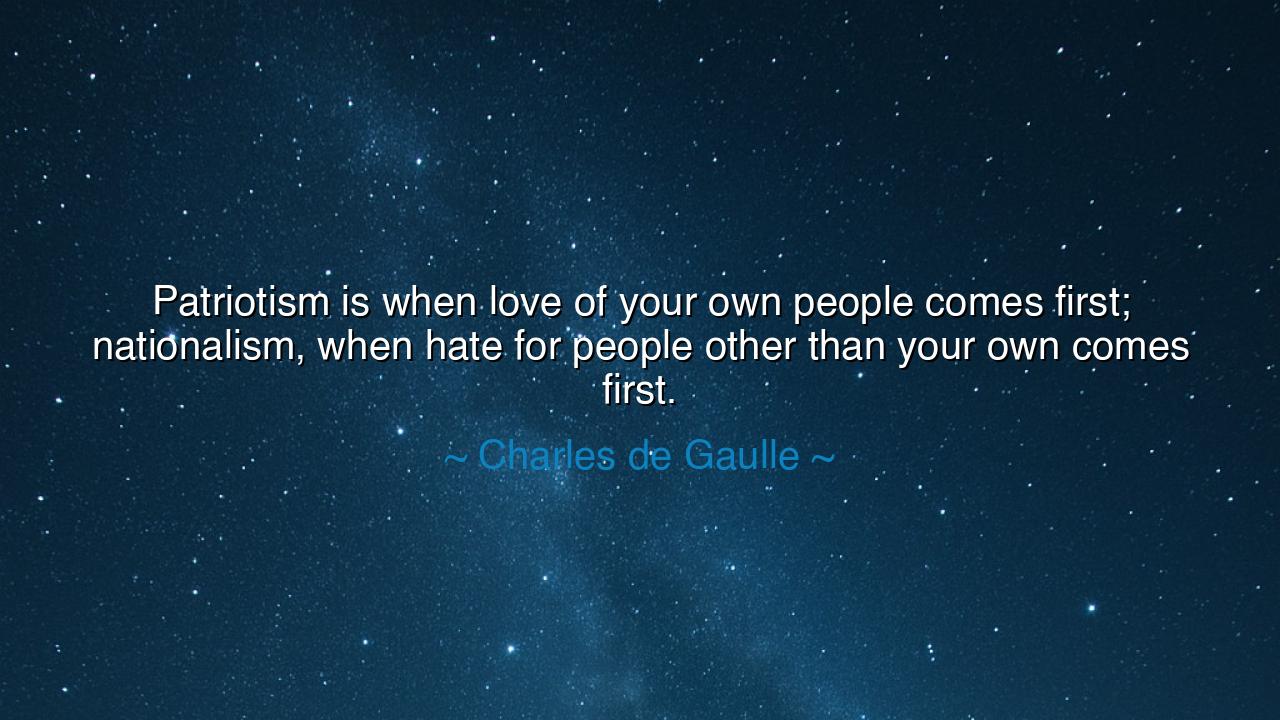
Patriotism is when love of your own people comes first;
Patriotism is when love of your own people comes first; nationalism, when hate for people other than your own comes first.






"Patriotism is when love of your own people comes first; nationalism, when hate for people other than your own comes first." These profound words spoken by Charles de Gaulle illuminate the delicate and often dangerous line that separates patriotism from nationalism. Patriotism is a love for one's own people, a bond of loyalty, pride, and care that celebrates the virtues and strengths of the nation. Nationalism, however, is a distortion of this love, turning it into something toxic — a fervent, often hostile devotion that seeks to elevate one's own nation at the expense of others. De Gaulle's wisdom echoes through the ages, reminding us that true love for one's people should embrace and celebrate their goodness, but never at the cost of despising others.
In the age of the ancients, love for one’s homeland and people was a deeply sacred bond. The Greeks had a word, patriotēs, which conveyed a sense of duty and belonging to the community — it was love for the polis, the city-state, and for the shared values and ideals that bound the people together. However, they also recognized the potential for hubris — the pride that goes beyond honor and loyalty, descending into arrogance and a disdain for others. The Spartan ideal, for example, was built upon a fierce loyalty to one’s own city-state, but it also bred an intense hostility toward outsiders, especially their rivals in Athens. In this tension between love and hate, the ancient world offers us a mirror to de Gaulle’s warning: patriotism must unite, while nationalism can divide.
Consider the Roman Empire, a vast entity that began as a small city-state but grew through the love and dedication of its people, who believed in the virtues of Rome. At its best, Roman patriotism was an embrace of shared values — justice, order, and the dignity of the people. But when nationalism took hold, especially in the later stages of the Empire, it led to violence and conquest not for the welfare of others, but for the domination of other nations. In the Punic Wars, for example, the Romans' intense desire to assert superiority over their enemies, especially Carthage, led to an almost pathological hatred of their rivals. The lines between loyalty to Rome and hatred of Carthage became blurred, leading to the brutal destruction of Carthage in 146 BC. This nationalism, driven by hatred rather than love, left a scar on the world, demonstrating the perilous path that follows when love for one's people becomes entangled with contempt for others.
In modern history, we see these dangers vividly in the World Wars of the 20th century, where nationalism spiraled out of control, leading to horrific conflicts and suffering. The rise of Nazi Germany under Adolf Hitler offers a stark example of how nationalism can devolve into hatred for others. Hitler’s message was one of racial superiority and the subjugation of other peoples, rooted in the idea that Germany’s greatness was built on the extermination of those deemed “lesser.” This nationalism did not simply celebrate German culture or pride, but turned into a dark force that sought to destroy others. The atrocities of the Holocaust stand as a testament to what happens when nationalism is not tempered by love, but fueled by hate and fear of the “other.”
True patriotism, however, is the antidote to this destructive force. It is a love for one’s people that is inclusive, not exclusive; a celebration of what is good about one's nation, but never at the expense of others. Nelson Mandela, for example, embodied this true form of patriotism. His love for South Africa was rooted in the desire for justice and equality, not just for his own people but for all people within the nation, regardless of race. After his release from prison, he could have embraced the nationalistic fervor of his people, demanding vengeance and division. Instead, he chose reconciliation and unity, calling for forgiveness and shared responsibility. His vision of patriotism was one that uplifted his people while also respecting the human dignity of those who had oppressed them. Mandela's example reminds us that true love for one’s nation does not require hatred for others.
The lesson from de Gaulle’s words is clear: patriotism must be rooted in love — love for one’s people, but love that does not devolve into hatred or xenophobia. Nationalism, when driven by hate, turns love into something dark and destructive. Love for one's homeland should inspire us to build, to protect, and to serve the greater good, not to tear down others. As Socrates wisely said, "The unexamined life is not worth living." We must examine the motivations behind our love for our country and ensure that it is driven by the desire for good, not the desire for dominance.
So, my children, let us strive to be patriots, not nationalists. Let us love our people, our cultures, and our lands, but let that love always be tempered with the wisdom of humility, the vision of unity, and the compassion for others. Love for one’s country must never come at the cost of harming others. Instead, let our love inspire us to build a world where the greatness of each nation can coexist in peace and respect with the nations of the world. True patriotism is a force for good, a force that builds bridges, not walls. It is a love that uplifts not only those within our borders but also those beyond.






AAdministratorAdministrator
Welcome, honored guests. Please leave a comment, we will respond soon